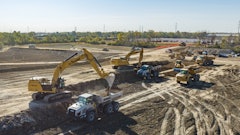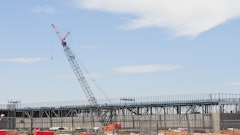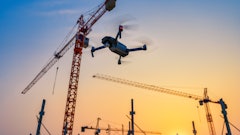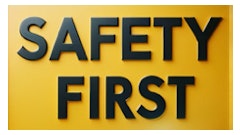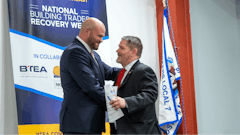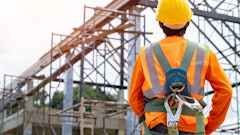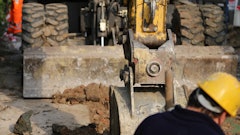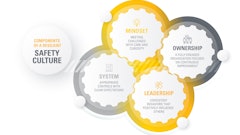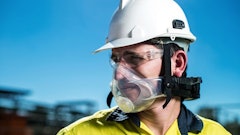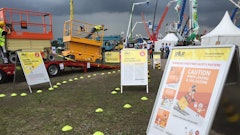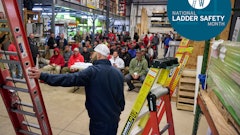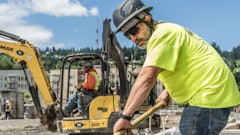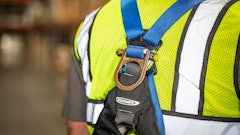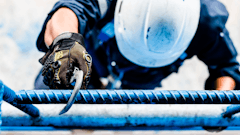
Safety within construction needs to be more than Occupational Safety and Health Administration (OSHA) compliance. More than keeping zones clear. More than the appropriate PPE. Although these tactical guidelines are vital, jobsite safety needs to go beyond implementing physical protection measures, in large part by putting people’s mental well-being at the forefront. This includes creating an environment that empowers someone to call for an all-stop when they notice a potential hazard, or to actively speak up about a concern they have during a routine morning meeting.
Construction safety can be as simple as asking “how are you?” This may seem small but making that connection and shift in communication can be the start of creating a stronger safety culture—one that takes a team’s mental health into consideration.
Mental health has always been a part of McCarthy Building Companies’ overall wellness strategy, but the pandemic underscored the need to make mental health awareness and acceptance a central focus, especially on jobsites.
Signs employees might be struggling. What you can start looking for:
• Are they tardy to work?
• Are they calling out sick?
• Are they short fused?
• Do they go off the handle quickly?
• Are they isolating themselves and working alone and away from their partner/group?
• Are they not talking?
• Are they sitting alone during break?
Founded in 1864, McCarthy Building Companies is one of—if not the oldest—construction companies in America. As a general contractor with five regions across the country, they work on multiple types of construction from renewables to vertical construction, hospitals, laboratories, schools, and more. Among the many projects they’ve completed, McCarthy was part of a joint venture with M. A Mortenson Company in the construction of the Allegiant Stadium (home of the Las Vegas Raiders). They are also responsible for the construction of the new UC Davis Health’s new Ernest E. Tschannen Eye Institute Building and expansion of the Ambulatory Care Center (ACC) in Sacramento, California.
At 159 years old (at the time of this writing, 2023), the employee-owned company consists of about 5,000 salaried employees and craft professionals across the country—with 800 of the firm’s staff working within the Northern Pacific Region alone. As one of America’s 100 largest construction companies, McCarthy employs a substantial number of safety professionals and project leadership out in the field and provides critical resources for all employees on and off the jobsite.
In 2021, McCarthy announced a new integrated approach to breaking the stigma surrounding mental health to better meet the needs of employees, their craft professionals, and their families.
McCarthy’s integrated approach to mental health was designed to create more discussion around mental health awareness, acceptance, and treatment options. The initiative establishes collaborative strategies and practices across McCarthy’s safety, human resources, and operations teams—all under the umbrella of the firm’s award-winning Build for Life health and wellness program. Future plans range from adding more support, resources, and training for managers and employees, to developing an evidence-based mental health crisis response system.
On jobsites, McCarthy distributes helmet stickers to all employees with important contact information and conducts meaningful discussions with all teams about the company’s approach to mental health, as well as immediately available resources. These tools, services and/or individuals are evaluated proactively to ensure needs are being met to help employees and their families understand and take advantage of the many resources available to them.
Almost all of McCarthy’s projects either have a full-time safety professional or a direct line to the regional safety leadership team. Trained in the company’s equal employment opportunity policy which has a high focus on harassment and bullying, these professionals make it a point to start the conversation around mental health at every project orientation and safety meeting. This ensures everyone knows where and who to go to if they’re having challenges.
Mental health challenges are not exclusive to construction. Recognizing this, McCarthy has been open around sharing detailed best practices about its approach and methods—along with posters and Toolbox Talk materials for others to consider (and ideally adopt) some of their tried-and-true tactics. Concrete Contractor was fortunate to connect with John Moore, CHST, CSM, the Regional Safety Director for the Northern Pacific Region of McCarthy Building Companies Inc.  John Moore, CHST, CSM, Regional Safety Director, McCarthy Building Companies Inc.McCarthy Building Companies Inc.
John Moore, CHST, CSM, Regional Safety Director, McCarthy Building Companies Inc.McCarthy Building Companies Inc.
Q. What are the biggest concerns with mental health at McCarthy?
If somebody is struggling with mental health, they’re not going to be mentally focused on the task at hand. In the safety world, people always typically think we're focused strictly on the physical side of safety. But mental health can affect the physical side with how people's moods are, their anxieties, their stress levels. A lack of clear focus could eventually lead to a person or persons injuring themselves, injuring others, or creating an incident that could affect the public.
Q. Workers may find it difficult to be vulnerable at work about mental health and talk to somebody. As a leader in safety, how do you create that open dialogue?
At McCarthy, our projects either have a full-time safety professional available on-site or they have the direct line to our regional safety leadership team. These professionals are trained in our EEO (equal employment opportunity) policy, which has a high focus on harassment and bullying. At every project orientation and periodically throughout the year, we discuss the topic of mental health at our morning safety meetings to ensure everyone knows where and who to go to if they're having challenges.
We pride ourselves in creating an open dialogue and establishing relationships that enable us to have honest conversations with asset safety professionals and support our project leadership teams.
(Editor's Note: Moore uses 'Jonathan' in the following situation as an example.)
If you're out in the field, Jonathan, I'm talking to you every day. “Hey, good morning, Jonathan, how you doing? Hey, how's the family doing?” and then I observe trends in the responses. You know, Jonathan's typically bubbly, right? He's always in a good mood. Recently, he hasn’t been showing up that way and it’s negatively affecting his communication with others. Maybe he’s being more reserved and that creates an opportunity for me to approach him and say, “Hey, how are you doing today? Hey, let's talk.”
Following any dialogue, we provide employees with the proper resources. We have brochures that are strategically placed so anyone on the jobsite can easily access the latest safety protocols and resources at a moment’s notice.
We invest in building those personal relationships, so all employees feel comfortable and that they have the agency to come up and talk to us. We're not judgmental in our communication, we aren’t going to make light of the situation, and we're going to provide them with the help they need to navigate next steps. I think that's breaking down that stigma— we're talking to everybody all the time.
If we're not breaking through to them or they're kind of shutting down, then we involve people that are closer to them. We'll talk to their co-workers, the ones that are working side by side with them and ask, “Hey, are you noticing anything? Is there something going on that we need to know about? Is there anything that we can help with?” We also continue connecting them to information about our available resources.
I think our training approach is incredibly effective, especially as a newer generation of people are entering the construction industry. Raising your hand is now being celebrated and encouraged. We’re moving away from days where asking for help was associated with an inherent fear of being perceived as “lacking competency,” when in reality a lack of communication about a situation brewing or a feeling that something is wrong can lead to someone’s safety being compromised. The entire industry is adapting to this shift, so whether a person is working for McCarthy or down the street working for another large general contractor, they're hearing consistent messaging about protecting one’s safety both physically and mentally. This is a priority amongst everybody. The industry is changing.
 McCarthy Building Companies Inc.
McCarthy Building Companies Inc.
Q. How has McCarthy destigmatized mental health care?
Ultimately, it boils down to the genuine connection we are building with our employees and their understanding that we're there for them. Safety professionals are responsible for supporting the team, recognizing safety challenges, and developing mitigation strategies. Sometimes that means we need to have hard conversations, but our relationship building fosters a stronger foundation of collaboration and trust. We’ve worked hard to move past “oh, the safety cop is here. Oh, man, here comes, John.” Our partners are more comfortable in raising their hands and asking for help because they know we are coming from the right place—that we truly care about them—and that breaks down those walls.
Our people and our partners know we're going to take care of them. Safety is our number one priority, and whether you're tied off or not is not the issue when you're having a mental breakdown or not focused. We can help correct that and get the necessary help to address whatever may be impacting someone’s ability to perform at 100%, which is only going to make that individual a safer employee.
Safety is the holistic part of it; it's not just “are you wearing your safety glasses?”
Q. What are some potential warning signs that employees are struggling? How do you address that in an appropriate way?
Some of the things that we look at include: Are they tardy to work? Are they calling out sick? Are they short fused? Do they go off the handle quickly? Are they separating themselves from the group and working more independently, even when partnered up to successfully complete an activity?
We also carefully observe break times and join our field teams. Who's not engaged with the conversations? Who’s choosing to sit alone vs. with the larger team? You start building those relationships. That's where you can focus in on. You can see the anxiety of people as it starts to rise. That's kind of what we look for and then talk from there.
Q. What can McCarthy do for that employee who’s sitting alone?
If the employee is open to discussing their challenges, one way we provide them support is by presenting them with a relevant resource, with could include the information on Lyra, a mental health resource provider that we at McCarthy partnered with beginning in 2022. They are like telemedicine in that they're accessible and respond quickly via a phone or video call with mental health professionals readily available the same day. So, for someone sitting alone we could say “here's a number that you can call through Lyra, it's strictly confidential. It's no cost to you. We suggest you talk to them.” That's Lyra in a nutshell. We want to make sure our employees have a direct line to mental health support whenever they and their families need it.
We'll do follow ups and ask, “hey, how's it going,” or “how you doing today,” “how's everything going?”, “how can I help you,” “you want to talk.” We avoid saying, “Hey, did you call them? Did you do that?” We just do the follow ups. This boundary continues to let them know we are here if they want to talk to us.
We implement our EEO policy. We have the harassment, bully, and mental health trainings. McCarthy provides us the resources and tools to best support our team members.
 McCarthy Building Companies Inc.
McCarthy Building Companies Inc.
Q. What resources does McCarthy have available? What can employers do to help their own craft professional employees?
We have our Employee Assistance Program and Lyra is a part of that. I remember when our Northern Pacific Regional Leadership Team got together to discuss Lyra’s implementation. We all understood its importance and communicated the resource through multiple channels. We visited our local jobsites and presented at our employee peer group meetings.
One thing that's different about McCarthy is Construction Safety Week. While it took place May 1-5, we talk about it multiple times a day, every day, every week. We're bringing it up at Toolbox Talks. We're talking about it during client and staff meetings. We're talking about it on the jobsites. It’s a consistent talking point that we prioritize.
And while we talk about Safety Week year-round, this 2023’s official week was a major highlight for us. We had the San Francisco Giants Mental Health Director come out and speak at one of our project sites. The research shows that better sleep (seven, eight hours of sleep a night), reducing caffeine and energy drink intake, less alcohol and substance abuse can make a real impact on one’s ability to put their best foot forward. But what she really keyed in on was being more physically active. Get out. Go on walks. Create. Do hobbies.
One thing we focus a lot on at McCarthy is making sure we have work/life success. Construction is a high stress and physically active career. People can get caught up, and the next thing you know, they’ve put in 12 hours in a single day. Then they go home and must navigate realities and challenges in their own personal lives. Our leadership is actively vocal about encouraging employees and our partners to prioritize our health, both physically and mentally. This could mean letting someone leave a meeting early to go address a family matter or granting them the flexibility to take a call from their car instead of staying in-person so they can get to a doctor’s appointment on time. In the end of the day, having constant and transparent communication is what we continue to prioritize with our people.
Q. Employees might have family members struggling with mental health on their own. How can employers help in this situation?
McCarthy offers resources for the entire family. At McCarthy, we partner with Lyra. Lyra’s services are accessible to all our employees and their family members at no cost. That’s why we put so much effort in communicating about our vast resources to connect our employees and their families so they can take advantage when in need.
McCarthy is also willing to support any company in the industry in setting up mental health programs and resources. They can reach out to our corporate McCarthy office, and our Safety Leadership Team will help guide them.
Q. How have employees responded so far?
They have all responded very well. I personally have a couple of colleagues I know have used the platform and they absolutely loved how efficient and helpful it was to their personal needs. They are still talking to the counselors via Lyra to this day. Our employees appreciate that the service is also available to family members. The overall feeling is McCarthy cares.
Q. What would be your advice for other construction companies in regard to mental health and safety?
Our workers, and I'm sure other construction companies feel the same way, are our number one asset. Projects are only completed with the help of our people, including the folks in the office, operations in the field, and our craftsmen and trade partners. I would highly recommend other industry partners reach out and connect with McCarthy, do the research, and find the right mental health partner for your company size. This step will make them a better company and make their employees better employees.
In our experience, it’s also going to retain your workers and inspire longer career development. Knowing they come into a safe place of employment, where they're cared about is very important.
Q. Any final thoughts?
The only other thing that I would say is that as McCarthy continues to grow, our workforce is continually changing. Newer generations are coming into the crafts and trades. Mental health prioritization is simultaneously growing and is now being viewed as equally as important as physical safety. Your mental health will dictate your actions throughout the day, and it’s our responsibility to be hyper focused on this!








